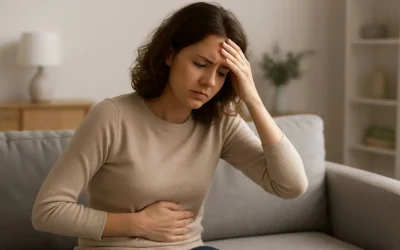Can Ovarian Cysts Affect Your Chances of Conceiving?
ON THIS PAGE
- Types of Ovarian Cysts & Their Impact on Fertility
- Symptoms & When to Be Concerned
- Can You Get Pregnant with Ovarian Cysts?
- Treatment Options & Their Impact on Fertility
- Natural & Alternative Ways to Support Fertility
- Psychological & Emotional Aspects
- Long-Term Fertility Planning & Prevention
- FAQ Section

Introduction: Understanding the Connection
If you’ve been told you have an ovarian cyst, one of the first questions on your mind might be, “Will this affect my ability to have a baby?” You’re not alone in wondering this, and it’s completely natural to worry.
Ovarian cysts are fluid-filled sacs that can develop on or inside your ovaries. While the term “cyst” sounds intimidating, the truth is that most are harmless.
However, some types can impact your fertility, and understanding the difference is key. This guide will walk you through everything you need to know, helping you feel more informed and empowered as you plan your family.
Quick Thought to Ease Your Worry:
Yes, many women with ovarian cysts go on to conceive naturally or with a little help. It all depends on the type, size, and how it affects your reproductive health.
Now, deep breath. You’ve got this. Let’s take a closer look, step by step.
Types of Ovarian Cysts & Their Impact on Fertility
Ovarian cysts aren’t created equal. Some are completely harmless and disappear on their own, while others may interfere with ovulation or hormone production.
Knowing the type of cyst you have is the first step toward understanding its potential impact on fertility.
Types of Ovarian Cysts
- Functional Cysts (Follicular & Corpus Luteum)
These are the most common and are often harmless. They form during your menstrual cycle as part of ovulation and usually disappear without you even noticing. Fertility impact? Minimal to none. - Endometriomas
These form due to endometriosis, where uterine-like tissue grows outside the uterus, sometimes attaching to the ovaries. They can damage the ovarian reserve (the number of healthy eggs you have), making it harder to conceive. - Polycystic Ovaries (PCOS)
This condition is not about “cysts” in the traditional sense but rather the presence of multiple small, underdeveloped follicles on the ovaries. PCOS can disrupt regular ovulation, which may require extra support when trying to conceive. - Dermoid Cysts & Cystadenomas
These are rare, non-functional cysts that grow because of abnormal cell development. While they don’t always impact fertility directly, they may need surgical removal if they grow large enough. - Cancerous Cysts
Thankfully, these are very rare. However, they require immediate medical attention and treatment, which may affect fertility planning.
Table for Quick Reference
| Type of Cyst | Impact on Fertility |
| Functional Cysts | Minimal or none |
| Endometriomas | Can reduce ovarian reserve |
| PCOS-Related Cysts | May disrupt ovulation, leading to fertility struggles |
| Dermoid/Cystadenomas | Rarely affects fertility directly; surgery may be needed |
| Cancerous Cysts | Requires immediate treatment; may impact fertility |
Are you starting to see how different cysts have different stories? Don’t worry—that’s why your gynecologist helps identify the type you’re dealing with.
Symptoms & When to Be Concerned
Not all ovarian cysts cause symptoms, but when they do, it’s your body’s way of telling you that something needs attention.
⇒Common Symptoms of Ovarian Cysts
- Pain or discomfort in the lower abdomen (often on just one side).
- Bloating or a feeling of heaviness.
- Irregular periods or spotting.
- Trouble emptying your bladder.
⇒When Cysts Might Affect Fertility?
Certain red flags can signal deeper issues that may interfere with conception. For example, cysts associated with conditions like endometriosis or PCOS often lead to hormone disruptions, larger cysts, or adhesions that can make pregnancy harder to achieve.
If you’re noticing persistent symptoms or pain, it’s worth having a conversation with your doctor.
Pro tip? Keeping a journal of your symptoms can help your doctor get a clearer view of what’s going on.
If you’re experiencing ovarian cyst symptoms or fertility concerns, Dr. Supriya Puranik, one of Pune’s top gynecologists, can help. Get expert care and guidance—book a consultation today!
Can You Get Pregnant with Ovarian Cysts?
Here’s the plain truth: Yes, you can get pregnant with ovarian cysts in many cases.
⇒Real-Life Success Stories
Take Sarah, for example. At 32, she was diagnosed with a functional ovarian cyst after months of unsuccessfully trying to conceive. With some monitoring and patience, her cyst resolved naturally, and she became pregnant three months later.
Then there’s Lata, who faced PCOS. With lifestyle changes and medical support, she regulated her cycles and welcomed her first child a year later.
These stories highlight that while ovarian cysts can pose challenges, they don’t always close the door to motherhood.
Treatment Options & Their Impact on Fertility
⇒Non-Surgical Treatments
- Birth Control Pills: Often prescribed to prevent the formation of new cysts. Keep in mind, they’re not a fix for existing cysts and may temporarily halt efforts to conceive.
- Hormonal Therapies: These can regulate periods and improve fertility in PCOS cases but may require time to show results.
- Lifestyle Changes: Managing weight, eating a balanced diet, and reducing stress can improve ovulation, especially in PCOS cases.
⇒Surgical Treatments
- Laparoscopy vs. Laparotomy: Minimally invasive surgery (laparoscopy) is often preferred to preserve ovarian function.
- Risks: Surgery carries the small risk of reducing ovarian reserve. The key is balancing fertility preservation with the need to remove problematic cysts.
⇒Doctor’s Insight:
Your doctor will weigh your personal health, cyst type, and fertility goals before recommending surgical options. Sometimes, monitoring is all that’s needed, especially for smaller cysts.
Natural & Alternative Ways to Support Fertility
While these methods won’t replace medical advice, they can offer complementary benefits.
- Acupuncture & Herbal Treatments: Some women find these help regulate cycles.
- Diet Adjustments: Focus on foods that balance hormones, like leafy greens, healthy fats, and lean proteins.
- Exercise & Stress Reduction: Moderation is key. Overexercising can harm ovulation, but gentle movement like yoga can help.
Wouldn’t it feel great to know you’re doing something proactive to support your health?
Psychological & Emotional Aspects
Health concerns, especially those tied to fertility, can feel isolating. If you’re feeling anxious or overwhelmed, you’re not alone.
⇒Ways to Cope
- Talk to someone you trust, whether it’s a therapist or a friend.
- Look for support groups where you can connect with others who understand.
- Practice mindfulness or journaling to help process emotions.
Remember, it’s okay to feel the way you do. What you’re experiencing is real, but you don’t have to face it alone.
Long-Term Fertility Planning & Prevention
Planning for your fertility isn’t just about now; it’s also about thinking ahead.
- Regular Checkups: Stay proactive about monitoring ovarian health.
- Egg Freezing: For those not ready to conceive now but worried about age or ovarian health, consider this option.
- Supplements & Preventive Measures: Folate, omega-3s, and antioxidants like CoQ10 can support overall fertility.
Think of this as an investment in your future self.
FAQ Section
1.Can ovarian cysts go away on their own?
Yes, most functional ovarian cysts resolve without intervention within a few months.
2.Do all ovarian cysts need surgery?
No, many don’t. Surgery is typically only recommended for large, persistent, or suspicious cysts.
3.How long should I wait to try to conceive after cyst removal?
This varies by individual. Your doctor may advise waiting 1-3 months, depending on your recovery.
Final Thoughts & Call to Action
Ovarian cysts can make an already emotional topic like fertility feel even more complicated. But here’s the truth: With the right knowledge and care, you have options, and there’s hope.
Your next step? Reach out to a trusted specialist or schedule a fertility consultation today. You deserve clarity, support, and a care plan tailored for you.
You’re one step closer to making your dream of parenthood a reality. And we’ll be here, cheering you on every step of the way.

-
About Author
Dr. Supriya Puranik
Gynaecologist & IVF Specialist
MMC -072514 (1993)
Dr. Supriya Puranik, a renowned gynaecologist and infertility expert, leads the IVF & Gynaecology department at Sahyadri Hospitals Momstory in Shivaji Nagar, Pune. She is committed to helping couples overcome infertility challenges.





